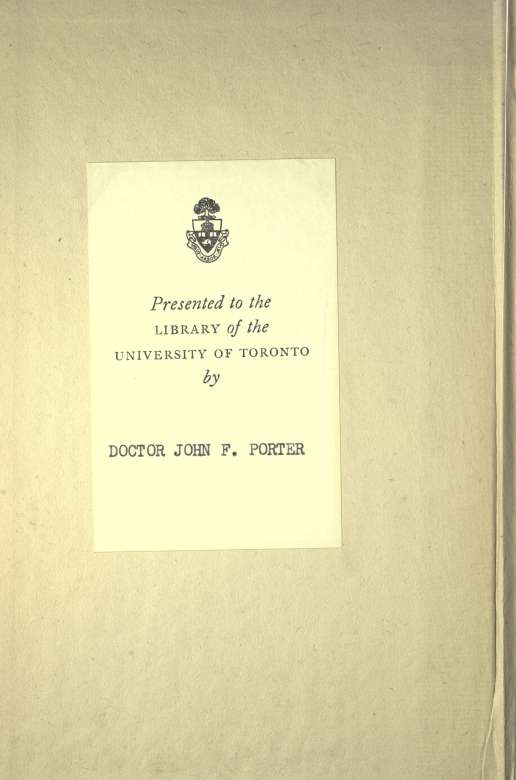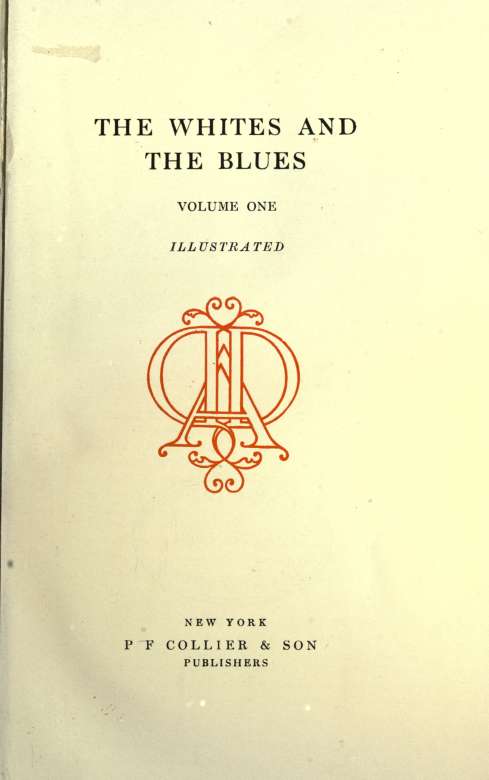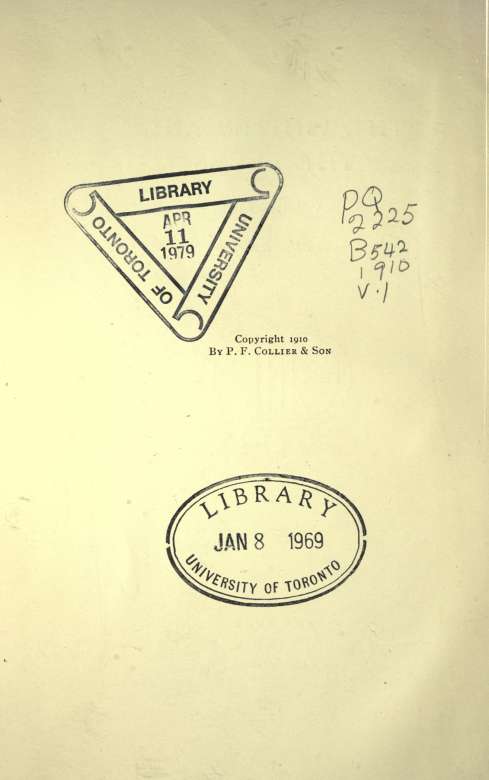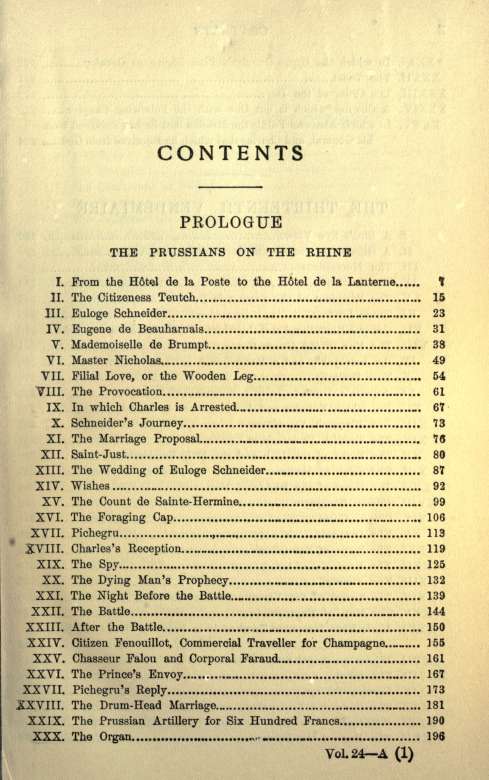The Whites and the Blues
Read The Whites and the Blues Online
Authors: 1802-1870 Alexandre Dumas
Tags: #Napoleon I, Emperor of the French, 1769-1821, #France -- History Revolution, 1789-1799 Fiction


This book made available by the Internet Archive.







CONTENTS
XXXI. In which the Organ-Grinder's Plan Begins to Develop...
XXXII. The Toast 207
XXXIII. The Order of the Day , 212
XXXIY. A Chapter which is but One with the Following Chapter 219
XXXV. In which Abatucci Fulfils the Mission that he has Received from
his General, and Charles that which he Received from God 224
THE THIKTEENTH YENDEMIAIKE
I. A Bird's-Eye View 230
II. A Glimpse of Paris — The Incroyables .. 234
III. The Merveilleuses .. 238
IV. The Sections 242
V. The President of the Section le Peletier 247
VI. Three Leaders .. 253
VII. General Roundhead and the Chief of the Companions of Jehu... 256
VIII. The Man in the Green Coat 261
IX. An Incroyable and a Merveilleuse .. 265
X. Two Portraits..... 270
XL Aspasia's Toilet 275
XII. For which Voltaire and Rousseau are to Blame.„ 278
XIII. The Eleventh Vendemiaire. 282
XIV. The Twelfth Vendemiaire .. „ 286
XV. The Night of the 12th and the 13th Vendemiaire 290
XVI. The Salon of Madame de Stael, the Swedish Ambassadress.... 293
XVII. The Hotel of the Rights of Man 306
XVIII. Citizen Bonaparte 310
XIX. Citizen Garat .. 314
XX. The Outposts 320
XXI. The Steps of Saint-Roch 325
XXII. The Rout 329
XXIII. The Victory....... „ » 333
XXIV. The Sword of the Vicomte de Beauharnais .... .. 336
XXV. The Map of Marengo „ 340
XXVI. Marie-Rose-Josephine Tascher de la Pagerie, Vicomtesse Beau harnais 345
XXVII. Where an Angel Steps a Miracle is Performed 349
XXVIII. The Sibyl 354
XXIX. Fortune-Telling 260
XXX. The Pretended Incroyable 365
XXXI. "Macbeth, thou Shalt be King!" 370
CONTENTS
THE EIGHTEENTH FKUCTIDOR
I. A Glance at the Provinces .. 383
II. The Traveller 388
III. The Chartreuse of Seillon 393
IV. The Traitor 398
V. The Judgment 402
VI. Diane of Fargas 407
VII. "What was Talked About for More than Three Months in the
Little Town of Nantua 412
VIII. A New Companion is Received into the Society of Jehu under
the Name of Alcibiades 417
IX. The Comte de Fargas............................. ................. 422
X. The Trouillasse Tower .. 426
XI. Brother and Sister .. . ............... 431
XII. In which the Reader will Meet some Old Acquaintances ... 436
XIII. Citizens and Messieurs .............. .... « . 441
XIV. The Cause of Citizen-General Bonaparte's Ill-Humor. 446
XV. Augereau .... 452
XVI. The Citizen-Directors 458
XVII. Mademoiselle de Sainte-Amour's Sick-Headache 465
XVIII. The Mission of Mademoiselle de Fargas 470
XIX. The Travellers 476
XX. "The Best of Friends Must Part" , 482
XXI. Citizen Frangois Goulin » . 487
XXII. Colonel Hulot -.«— ...... . 492
XXIII. The Battle 497
XXIV. Portia : 502
XXV. Cadoudal's Idea 507
XXVI. The Road to the Scaffold 513
XXVII. The Execution 518
XXVIII. The Seventh Fructidor. 524
XXIX. Jean-Victor Moreau « 530
XXX. The Eighteenth Fructidor 536
XXXI. The Temple 542
XXXII. The Exiles 548
XXXIII. The Journey 553
XXXIV. The Embarkation 559
CONTENTS
THE EIGHTH CKUSADE
I. Saint-Jean-d'Acre 572
II. The Prisoners.. .. .. 577
III. The Carnage 583
IV. From Ancient Days to Our Own 588
Y. Sidney Smith.... .............. ... 594
VI. Ptolemais 601
VII. The Scouts 607
VIII. The Beautiful Daughters of Nazareth 613
IX. The Battle of Nazareth 619
X. Mount Tabor... 624
XI. The Bullet Merchant 631
XII. How Citizen Pierre-Claude Faraud was made a Sub-Lieutenant.. 635
XIII. The Last Assault 640
XIV. The Last Bulletin 644
XV. Vanished Dreams 648
XVI. The Retreat 652
XVII. Wherein we see that Bonaparte's Presentiments did not De ceive Him 657
XVIII. Aboukir 662
THIS BOOK IS DEDICATED TO MY ILLUSTRIOUS FRIEND AND COLLABORATOR
CHAELES NODIER
I have used the word "collaborator" because the trouble I should take in seeking for a Setter would be thrown away.
ALEX AND RE DUMAS
THE WHITES AND THE BLUES
VOLUME ONE
THE WHITES AND THE BLUES
PROLOGUE THE PRUSSIANS ON THE RHINE
CHAPTEE I
FROM THE HOTEL DE LA POSTE TO THE HOTEL DE LA LANTEKNE
ON THE 21st Frimaire of the year II. (llth of De-' comber, 1793), the diligence from Besan9on to Strasbourg stopped at nine o'clock in the even ing in the courtyard of the Hotel de la Poste, behind the cathedral.
Five travellers descended from it, but the youngest only merits our attention.
He was a boy of thirteen or fourteen, thin and pale, who might have been taken for a girl dressed in boy's clothes, so sweet and melancholy was the expression of his face. His hair, which he wore cut a la Titus—a fashion which zealous Kepublicans had adopted in imitation of Talma— was dark brown; eyelashes of the same color shaded eyes of deep blue, which rested, with remarkable intelligence, like two interrogation points, upon men and things. He had thin lips, fine teeth, and a charming smile, and he was dressed in the fashion of the day, if not elegantly, at least so carefully that it was easy to see that a woman had super intended his toilet.
The conductor, who seemed to be particularly watchful of the boy, handed him a small package, like a soldier's knapsack, which could be hung over the shoulders by a pair of straps. Then, looking around, he called: u Hallo I
(7)
THE WHITES AND THE BLUES
Is there any one here from the Hotel de la Lanterne look ing for a young traveller from Besan9on ?"
"I'm here," replied a gruff, coarse voice.
And a man who looked like a groom approached. He was hardly distinguishable in the gloom, in spite of the lan tern he carried, which lighted nothing but the pavement at his feet. He turned toward the open door of the huge vehicle.
"Ah! so it's you, Sleepy-head," cried the conductor.
4 'My name's not Sleepy-head; it's Cocl&s," replied the groom, in a surly tone, "and I am looking for the citizen Charles.*'
"You come from citizeness Teutch, don't you?" said the boy, in a soft tone that formed an admirable contrast to the groom's surly tones.
"Yes, from the citizeness Teutch. Well, are you ready, citizen?"
" Conductor," said the boy, "you will tell them at home—"
"That you arrived safely, and that there was some one to meet you; don't worry about that, Monsieur Charles."
"Oh, ho!" said the groom, in a tone verging upon a menace, as he drew near the conductor and the boy.
"Well, what do you mean with your 'Oh, ho' ? "
"I mean that the words you use may be all right in the Franche-Comte*, but that they are all wrong in Alsace."
"Eeally," said the conductor, mockingly, "you don't say so?"
"And I would advise you," continued citizen Codes, "to leave your monsieurs in your diligence, as they are not in fashion here in Strasbourg. Especially now that we are so fortunate as to have citizens Lebas and Saint-Just within our walls."
"Get along with your citizens Lebas and Saint-Just! and take this young man to the Hotel de la Lanterne."
And, without paying further heed to the advice of citi zen Codes, the conductor entered the Hotel de la Poste.
The man with the torch followed the conductor with hia eyes, muttering to himself; then he turned to the boy: "Come on, citizen Charles," he said. And he went on ahead to show the way.
Strasbourg, even at its best, was never a gay, lively town, especially after the tattoo had been beaten for two hours; but it was duller than ever at the time when our story opens; that is to say, during the early part of the month of December, 1793. The Austro-Prussian army was literally at the gates of the city. Pichegru, general-in-chief of the Army of the Rhine, after gathering together all the scattered forces at his command, had, by force of will and his own example, restored discipline and resumed the offensive on the 18th Frimaire, three days before; or ganizing a war of skirmishing and sharpshooting, since he was powerless to offer battle. He had succeeded Houchard and Custine, who had been guillotined because they had met with reverses, and Alexandre de Beauharnais, who was also in danger of being guillotined.
Furthermore, Saint-Just and Lebas were there, not only commanding Pichegru to conquer, but decreeing the vic tory. The guillotine followed them, charged with execut ing their decrees the instant they were made.
And three decrees had been issued that very day.
The first one ordered the gates of Strasbourg to be closed at three o'clock in the afternoon; any one who delayed their closing, if only for five minutes, did so under pain of death.
The second decree forbade any one to flee before the en emy. The rider who put his horse to a gallop, or the foot-soldier who retreated faster than a walk, when turning his back on the enemy on the field of battle, thereby incurred the penalty of death.
The third decree, which was due to fear of being sur prised by the enemy, forbade any soldier to remove his clothing at night. Any soldier who disobeyed this order, no matter what his rank, was condemned to death.
The boy who had just entered the city was destined to
THE WHITES AND THE BLUES

see each of these three decrees carried into effect within six days after his arrival in the city.
As we have said, all these circumstances, added to the news which had just arrived from Paris, increased the nat ural gloominess of the city.
This news told of the deaths of the queen, the Due d' Or leans, Madame Koland, and Bailly.
There was talk of the speedy recapture of Toulon from the English, but this was as yet a mere rumor.
Neither was the hour liable to make Strasbourg appear to advantage in the new-comer's eyes. After nine o'clock in the evening the dark, narrow streets were wholly given up to the patrol of the civic guard and of the company of the Propagande, who were watching over the public welfare.
Nothing, in fact, could be more depressing and mourn ful to a traveller newly arrived from a town which is neither in a state of war nor on the frontier than the sound of the nocturnal tramp of an organized body, stopping suddenly at an order given in a muffled tone, and accompanied by the clashing of arms and the exchange of the password each time two squads met.
Two or three of these patrols had already passed our young traveller and his guide, when they met another, which brought them to a halt.with the challenging, "Who goes there?"
In Strasbourg there were three different ways of replying to this challenge, which indicated in a sufficiently charac teristic way the varying opinions. The indifferent ones re plied, '' Friends!'' The moderates, ' * Citizens!'' The fanat ics, "Sans Culottes!"
"Sans Culottes!'' Codes energetically answered the guard.
"Advance and give the watchword!" cried an imperious voice.
"Ah, good!" said Codes, "I recognize that voice; it be longs to citizen Te'trell. Leave this to me."
"Who is citizen T&rell?" asked the boy.
"The friend of the people, the terror of the aristocrats,
an out-and-outer." Then, advancing like a man who has nothing to fear, he said: "It is I, citizen Tetrell!"
"AhI you know me," said the leader of the patrol, a giant of five feet ten, who reached something like a height of seven feet with his hat and the plume which surmounted it.
4 ' Indeed I do," exclaimed Codes. *' Who does not know citizen Tdtrell in Strasbourg?" Then, approaching the co lossus, he added: "Good-evening, citizen Tdtrell."
"It's all very well for you to know me," said the giant, "but I don't know you."
'' Oh, yes you do! I am citizen Codes, who was called Sleepy-head in the days of the tyrant; it was you yourself who baptized me with the name when your horses and dogs were at the Hotel de la Lanterne. Sleepy-head! What, you don't remember Sleepy-head?"
"Why, of course I do; I called you that because you were the laziest rascal I ever knew. And who is this young fellow?"
"He," said Codes, raising his torch to the level of the boy's face—"he is a little chap whom his father has sent to Euloge Schneider to learn Greek."